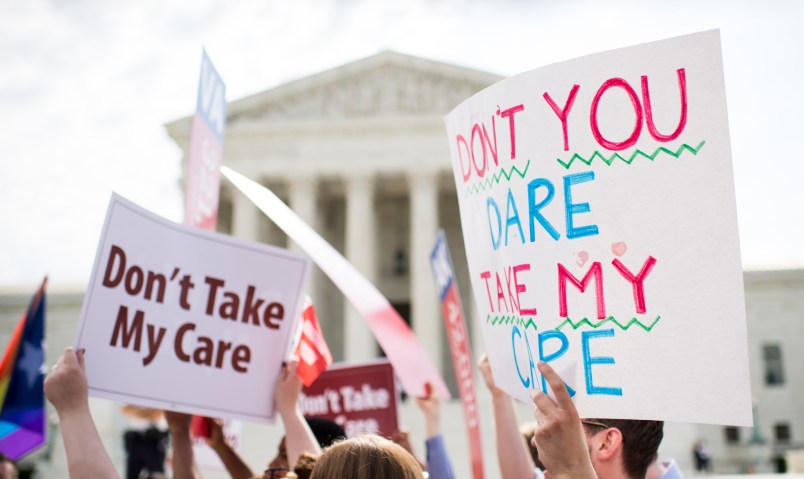A new report published by the Commonwealth Fund this week highlighted a variety of aspects of the insurance coverage gains made after Obamacare was passed, including a sizable decrease in the number of people who say they skipped going to the doctor because of cost concerns. In 2013, before the law had gone fully into effect, 20 percent of adults said they had forgone seeking medical treatment because of the cost. Two years later, after the ACA had been mostly implemented, that number had shrunk to 13 percent nationally.
“The historic decline in uninsured rates has been accompanied by widespread reductions in cost-related access problems and improvements in access to routine care for at-risk adults,” the study said.
The study found that the uninsured rates dropped in every state, but that there were some particularly large decreases in the uninsured rates for low-income adults in states that expanded Medicaid under the law. (States were given the option to opt-out of Medicaid expansion with a 2012 Supreme Court decision, and many red states have chosen to do so).
“Nine such states experienced 10 to 13 percentage-point reductions in their adult uninsured rate from 2013 to 2015. Six of these states—California, Kentucky, Oregon, Rhode Island, Washington, and West Virginia—sliced their uninsured rates by at least half over the two years,” the report said.
The study also examined how the uninsured rates have changed under the ACA with regards to the disparities between white and black or Hispanic communities. Between 2013 and 2015, there were significant coverage gains made among those minority groups: the national uninsured rate dropped to 15 percent from 24 percent among black adults and to 28 percent from 40 percent among Hispanic adults. But here too, states’ decision to expand Medicaid played a crucial role.
“In states that expanded Medicaid as of January 2015, the average uninsured rate for nonelderly black adults was 11 percent compared to 19 percent in states that did not expand,” the report said. “For Hispanics, the difference was even greater: the average uninsured rate was 22 percent in states that expanded Medicaid and 36 percent in states that did not.”
The study comes as Republicans are plotting their moves to repeal Obamacare without a replacement, which they say they’ll come up with in a two- to four- year transition phase. It is unclear whether GOP lawmakers will seek in their ACA alternative to match Obamacare’s achievements in coverage access.







That will change when Donnie the Thumbs is inaugurated… they have to follow Alan Grayson’s tweetable ‘Get sick. Die quick’ summation.
Fewer people skipping probably means more people are healthier and living longer. The first result is an assault on the income of doctors everywhere and the second means more money being paid out in “entitlements” which Republicans don’t like at all.
Before I became a senior citizen I didn’t realize just how much the Republican party leadership resents senior citizens. I thought Grayson was over the top, but when your own economic interests are involved you pay close attention. Republicans do want to see people die quickly, but only after they have extracted as much money as possible for their friends in the healthcare industry.
To republicans this is a flaw not a feature. Undesirable sick people getting in the way of the rich trying to make an appointment for a hang nail.
It’s also cheaper and more effective. The earlier you catch a condition, the cheaper it is to treat it and the greater the likelihood of a successful outcome.
It is good, ergo it must die.
GOP logic.
I wish the GOP was a hallway full of terrified rebel soldiers, and I was Darth Vader standing in the doorway, lightsaber ablaze.
I assume some of you who have visited the cinema recently understand that to which I refer.